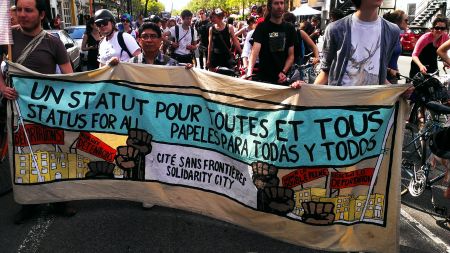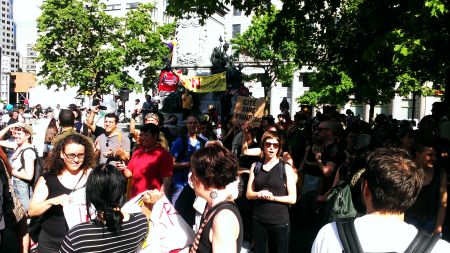MONTREAL—On a sunny afternoon last Saturday, hundreds of people set out on marches from the four corners of Montreal to voice their support for migrants, refugees and non-status people. While their action was almost cut short by police attempts to end the marches before they even began, they successfully traced their routes to downtown Montreal, chanting and handing out thousands of flyers along the way.
“Today there are thousands and thousands of people who live in this country without status. They're fighting for a better life, fighting against the capitalist system that is forcing them to leave their homes. Together we're united and together we can take the streets and fight for status for all,” said Andrea Figueroa, of No One is Illegal, at a speech during the march.
Dubbed the Status for All march, the decade-old event was organized this year by Dignidad Migrante, Mexicans United for Regularization, the Immigrant Workers’ Centre, No One Is Illegal-Montreal and Solidarity Across Borders. Starting in Villeray, Verdun, Côte-des-Neiges and Hochelaga, all four groups converged on Philips Square for a community festival. By the time the last group had arrived, hundreds were already there with balloons, food, banners and pinatas.
While a festive mood, the event meant to highlight very serious concerns about the persecution and marginalization of immigrants – both those with and without official status. The events' primary four demands were: Status for all, meaning that all residents of Canada obtain the documents allowing them to receive necessary services and rights afforded to everyone else; an end to deportations, especially those breaking up families; an end to all immigration detention; and an end to what is dubbed “double punishment”: when migrants face criminal convictions, they are also doubly punished by facing possible deportation.
Building a Solidarity City
This year, the march was also to show support for Solidarity City, a campaign to ensure that residents of Montreal have access to essential services in the city. Solidarity Across Borders (SAB) and other groups have been campaigning vigorously about this over the past year, including to ask the Commission Scolaire de Montréal to allow all students to enroll, regardless of immigration status. Currently students need to present proof of citizenship or residency to register for school in Quebec. Another focus has been on Montreal food banks. Not known to many, food banks often ask for documentation proving a person's immigration status before providing them with food.
At the heart of many of these demands is the fact that migrants are searching out a better life, often because they are displaced by economic difficulties or by war and violence. Christina Xydous spoke of the ongoing anti-immigration backlash in Greece as a warning of what we need to be vigilant of in Canada.
“You've certainly heard of a lot about the problems taking place right now in Greece, with the sharp rise of the extreme right, fascism and intolerance, racist attacks from neo-nazis towards people who are simply trying to escape a miserable existence in their own country,” she told the crowd at a stop in the march near Rosemont metro.
Xydous, the daughter of Greek immigrants to Canada, and who has lived both in Canada and in Greece, continued: “What I want to share with people today is that [what is happening in Greece] is nothing special, it's something that could also happen here if the economic situation deteriorates. It's not because Greeks are particularly vicious or anything; it's that the economic conditions result in a situation where fear reigns, and it's against fear that we must fight, [and we also fight] to point clearly to the real people at the root of our misery: those who have the resources and the wealth while the rest of us are forced to fight over crumbs. “
Police attempt to stifle protests with P-6
While the protest primarily focused on the plight of migrants, also at issue was the simple right to protest. Since March, Montreal police have been strictly enforcing municipal bylaw P-6, which requires demonstrators to provide their itinerary to police in advance of any event. If not, all participants in the demonstration face fines of $647. The police have taken to kettling large groups of protesters – up to 300 at a time – for several hours in order to end protests and process participants for tickets.
Organizers of the march interviewed have said they recognized early on that this would be a concern for the demonstration, particularly those already in precarious legal situations because of their immigration status. After internal discussions, though, they decided to support the ongoing campaign against P-6 and refused to give their itinerary to the Montreal police.
As they explained in a pamphlet handed out before and during the march: “We do not believe our principled position [opposing P6] will result in police interference with our march. Member organizations of the Status for All coalition have organized family-friendly marches in past months, without notifying police and there has been no police interference... Although we believe this will be a perfectly safe march, we don't want to take any risks. We have therefore prepared a number of safety precautions, including protocols for decision-making teams and police liaisons in each contingent. If we believe that the march is becoming unsafe we will make that clear to participants for that anyone who wants to can leave.” In the same pamphlet, they also explained that receiving a ticket under P-6 cannot be used against someone at their immigration hearings. Organizers recognized, though, that people without status, including those facing deportation orders, are at risk during any interaction with authorities, whether being ticketed or not.
Their concerns about police actions were clearly founded, as marches at three of the starting points – Villeray, Côte-des-Neiges, and Verdun faced pressure from the police not to march. It is not clear if all the threats were under P-6, as Mostafa Henaway, who was at the Côte-des-Neiges gathering point, said police threatened to ticket people under traffic laws. Montreal police have in the past also given out $450 tickets under a law against blocking the circulation of traffic. As Henaway pointed out, the police ended up blocking more traffic while they made sure the demonstration remained on the sidewalk than if they had simply let the gathering of 80 or so people walk in the streets.
In Verdun and Villeray, according to organizers, police threatened tickets under P-6 if they did not remain on the sidewalk. In both locations, organizers informed marchers of the risk, and most still took to the streets. In the southwest, once the street was taken police backed away, but in Villeray there were reports of more police pressure. According to Jaggi Singh, one of the events organizers, police used their cars to physically squeeze marchers on the street back onto the sidewalk after the march had begun, and police cars continued to follow once they entered Jarry Park. Once on the other side of the park, though, they crowd grew and retook the streets, this time being able to walk the entire way downtown to Phillips square, via stops at Park and Rosemont metro stations.
In Côte-des-Neiges, a neighbourhood with one of the largest immigrant populations in Quebec, the contingent was the most heavily made up of migrant folks and people of colour. According to Henaway, who works at the Immigrant Workers Centre in Côte-des-Neiges, police officers kept saying they were in favour of allowing people to have their say, but that they could only do so from the sidewalk, a stance he described as hypocritical. “If they were really in support, they would have let us take the streets,” he said.
Instead, the 80 people assembled remained on the side walk. Spirits remained high, according to Henaway, particularly when a Chilean woman passing by stopped to share her story. She happened to be one of the 70 Chilean refugees who sought refuge in Montreal's Saint Jean de la Croix Catholic church in 1998 in order to highlight problems in the Canadian immigration and refugee system.
Eventually, about 50 people got on the metro and joined up the march coming from Verdun in front of the federal immigration offices at 1010 St-Antoine and marched together to Philips Square. While Henaway feels the action in Côte-des-Neiges was successful, he says that such police actions unduly limit the ability of immigrants and non-status people to voice their concerns.
"Protest laws have particular impact on migrants"
“These laws have a particular impact on migrants, people already more vulnerable. Even if it's a ticket and not a criminal charge...It places even more pressure on folks who want to be able to express themselves on migrant justice, it makes it virtually impossible,” he said.
The fact that police pressured demonstrators to not march, but then allowed them to proceed, shows the hypocrisy in how police patrol protests, said Singh in an interview. He pointed out that while none of the demonstrations provided routes to the police, SPVM spokespeople have told media outlets that three out of four marches did provide itineraries. “They [the SPVM] are making arbitrary applications of P-6, clearly,” he said. “There's no reason to lie about what were saying. We were openly saying that we would not provide our itineraries...The point is that [P-6] gives police arbitrary powers, and they are trying to mask it through misinformation.”
Singh, who was caught in the kettle during the anti-capitalist May Day march on May 1, added that that march had not been any more violent than the Status for All march before it was stopped. It points to police profiling protesters based on their politics, which is unacceptable, he said.
Solidarity Across Borders intends to continue it's campaign for a Solidarity City through the coming months, starting with a demonstration for their Education for All campaign at tonight's meeting of the Commission Scolaire de Montréal.





